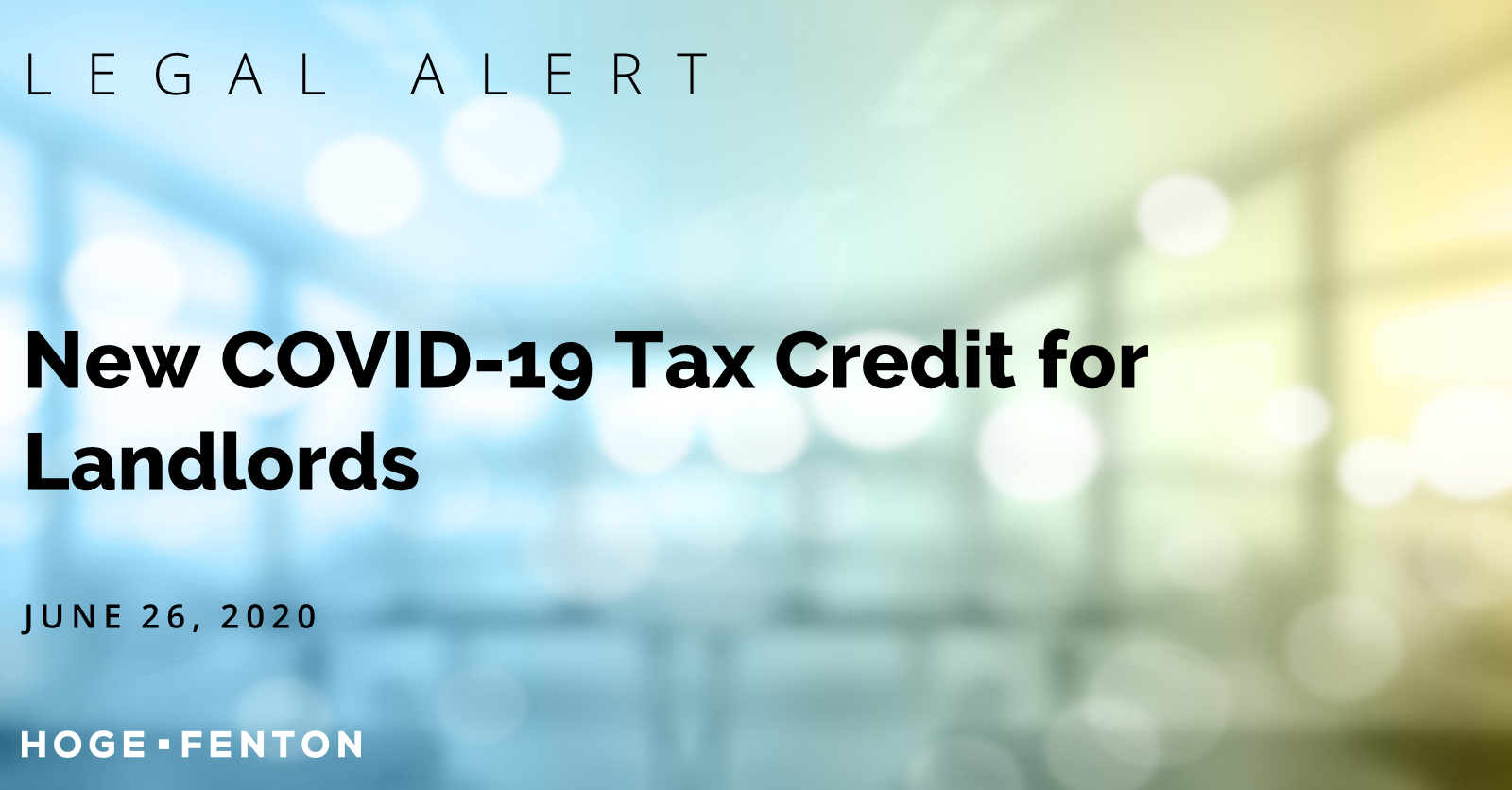New COVID-19 Tax Credit for Landlords
By Hoge Fenton | 06.26.2020 | Client Alerts

By: Alex Ramon
SB 1410 creates a mechanism by which California landlords who allow tenants to defer rent payment during the crisis may become eligible for a state tax credit in the amount of unpaid rent. SB 1410 as Amended on June 16, 2020, adds new sections to various California codes to address COVID-19’s impact on residential tenancies throughout the state. To accomplish this goal, SB 1410 adds section 1947.20 to the Civil Code, section 1161.05 to the Code of Civil procedure, and sections 17053.10, 17154.5, 19534, 23610, and 24311 to the Revenue and Taxation Code. Below are some important points for landlords to keep in mind.
- Civil Code section 1947.20 defines “owner of real property” for purposes of this section as an owner of residential real property or an owner of a mobile home park. By this definition, the relief provided by SB 1410 excludes commercial tenancies. Specifically, 1947.20 authorizes landlords and tenants to sign and execute tenant-owner rent stabilization agreements during the state of emergency and for an as of yet unspecified number of days thereafter.
- The tenant-owner rent stabilization agreement allows the tenant to defer the tenant’s unpaid rent and prohibit the owner from serving a notice terminating the tenancy or filing a complaint for unlawful detainer for the unpaid rent during the state of emergency, unless an exception applies. In exchange, the landlord (after registering with the Franchise Tax Board) becomes eligible for a credit against their tax liability pursuant to section 17053.10 and 23610 of the Revenue and Taxation Code.
- Civil Code section 1947.20 expires on December 31, 2034.
- Civil Code section 1161.05 voids any demand for payment of unpaid rent and any notice terminating a tenancy if served during the state of emergency or as of yet unspecified number of days thereafter and the conduct that gave rise to the demand or notice occurred during the state of emergency or as yet unspecified days thereafter.
This code section provides two exceptions to the general prohibition: (1) the notice and related complaint is necessary to protect public health and safety; or (2) the notice or related complaint includes either a signed acknowledgment of receipt or a sworn confirmation of a rejected offer pursuant to Civil Code section 1947.20 subd., (c). Consequently, a tenant may not delay or refuse to execute a tenant-owner rent stabilization agreement as described in section 1947.20. In those instances, landlords may pursue traditional methods to recoup lost rent and regain possession.
- Revenue and Taxation Code sections 17053.10 and 17154.5, allows landlords for the taxable years beginning on January 1, 2024 and before January 1, 2034 to exclude from gross income the gross amount of unpaid rent in a signed tenant-owner rent stabilization agreement pursuant to Civil Code section 1947.20.
On March 3, 2020, San Jose voters passed Measure E by a simple majority of votes and added Chapter 4.59 to the San Jose Municipal Code. Properties transferred for $2M or more are now subject to an additional tax:
- Transfers from $2M to $5M will be taxed at a rate of 0.75%
- Transfers from $5M to 10M will be taxed at 1.00%
- Transfers over $10M will be taxed at a rate of 1.50%
Hoge Fenton attorneys have the knowledge and experience needed to help landlords and tenants navigate leases with functional and sensible solutions during these challenging times. We strive to analyze and explain the relevant law in these areas, and update our Reopening California Resources page (specifically, the Real Estate and Land Use page) periodically to include relevant California, federal and local laws, rules and regulations that are enacted during this crisis. Please do not hesitate to reach out to our attorneys below if you need more guidance.
 |
 |
|
Attorney
Business Litigation
Ethics & Pro. Liability
+1.408.947.2430
|
Chair, Real Estate &
Land Use
Construction
+1.925.460.3362
|
This information is provided as an educational service by Hoge Fenton for clients and friends of the firm. This communique is an overview only, and should not be construed as legal advice or advice to take any specific action. Please be sure to consult a knowledgeable professional with assistance with your particular legal issue. © 2020 Hoge Fenton










